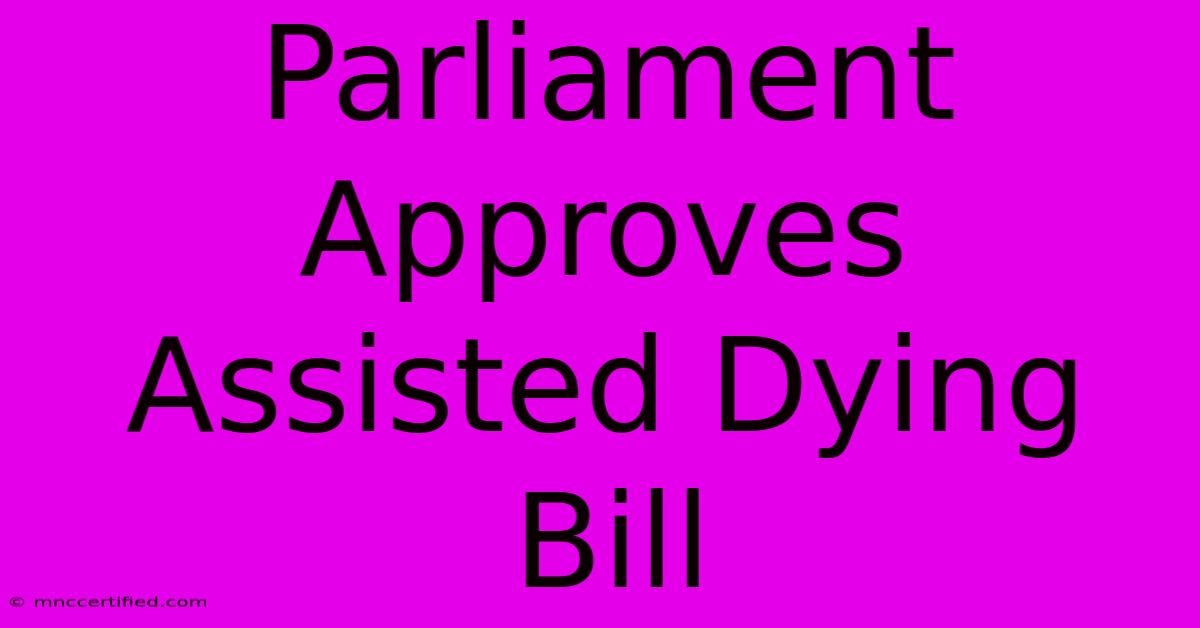Parliament Approves Assisted Dying Bill

Table of Contents
Parliament Approves Assisted Dying Bill: A Landmark Shift in End-of-Life Care
The recent approval of the Assisted Dying Bill marks a significant turning point in the ongoing debate surrounding end-of-life choices. This landmark legislation grants terminally ill adults the right to seek medical assistance in dying under specific, tightly controlled circumstances. This article delves into the key aspects of the bill, exploring its implications, potential benefits, and the ethical considerations that continue to fuel the discussion.
Key Provisions of the Assisted Dying Bill
The newly approved bill isn't a blanket authorization for assisted suicide. Instead, it establishes a robust framework designed to protect vulnerable individuals and prevent abuse. Key provisions typically include:
-
Strict Eligibility Criteria: Patients must meet stringent criteria to qualify. This generally involves a terminal illness with a prognosis of less than six months to live, incapacitating suffering, and a clear and informed consent process. Multiple medical assessments are usually required to confirm the diagnosis and prognosis.
-
Independent Medical Evaluations: The bill mandates independent medical evaluations by two physicians to ensure the patient meets all eligibility criteria. This safeguards against coercion or undue influence.
-
Mental Capacity Assessment: A thorough assessment of the patient's mental capacity is crucial to ensure they are capable of making such a significant decision. This evaluation helps to exclude individuals experiencing temporary mental distress or coercion.
-
Safeguards Against Coercion: The bill incorporates measures to protect vulnerable individuals from coercion by family members or others. This might involve mandatory consultations with independent counselors or support groups.
-
Right to Withdraw: Patients retain the right to withdraw their request for assisted dying at any point before the procedure is carried out.
Arguments For and Against Assisted Dying
The debate surrounding assisted dying is complex and deeply emotional. Supporters emphasize patient autonomy and the importance of allowing individuals to control their final moments, particularly when facing unbearable suffering. They highlight the right to die with dignity and relieve pain that cannot be effectively managed.
Opponents often raise concerns about slippery slopes, arguing that legalizing assisted dying could lead to the devaluation of human life and potential abuse. They may cite religious or ethical objections, stressing the sanctity of life and the potential for unintended consequences, including pressure on vulnerable individuals to choose assisted dying. The discussion also involves potential burdens on healthcare systems and the need for meticulous oversight.
Addressing Ethical Concerns
The legislation aims to address ethical concerns through rigorous safeguards and oversight. Independent review boards and ongoing monitoring are essential to ensure the law is applied fairly and prevents abuse. Transparency and public accountability are crucial in building trust and maintaining ethical standards.
The Impact on Healthcare and Society
The successful passage of this legislation signifies a significant shift in societal attitudes towards end-of-life care. It could lead to improved palliative care services, as resources are shifted to focus on providing better comfort and pain management for terminally ill patients. However, the long-term effects on society and the healthcare system require careful monitoring and ongoing evaluation.
The Future of Assisted Dying Legislation
The approval of this bill is likely to spur further discussion and potential legislative changes in other jurisdictions. The debate will continue, encompassing evolving medical advancements, ethical considerations, and societal views on death and dying. Ongoing research, public education, and open dialogue are vital to shaping future policy and ensuring compassionate end-of-life care for all.
Keywords: Assisted dying, assisted suicide, end-of-life care, euthanasia, parliament, legislation, bill, medical assistance in dying, palliative care, ethical considerations, patient autonomy, right to die, terminal illness, safeguards, coercion, eligibility criteria, mental capacity.
Note: This article provides general information and does not constitute legal or medical advice. Consult with relevant professionals for specific guidance. The specifics of assisted dying legislation vary significantly by jurisdiction.

Thank you for visiting our website wich cover about Parliament Approves Assisted Dying Bill. We hope the information provided has been useful to you. Feel free to contact us if you have any questions or need further assistance. See you next time and dont miss to bookmark.
Featured Posts
-
Rebels Honor 34 Seniors
Nov 30, 2024
-
Best Sephora Black Friday 2024 Deals
Nov 30, 2024
-
Apple Black Friday 2024 15 Best Deals
Nov 30, 2024
-
College Football Playoff Key Games
Nov 30, 2024
-
Update Stephen Mulherns Hospital Stay
Nov 30, 2024